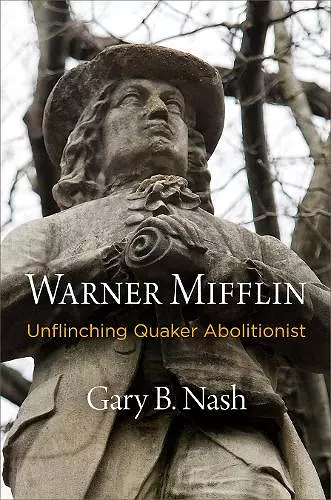Warner Mifflin
Unflinching Quaker Abolitionist
Format:Hardback
Publisher:University of Pennsylvania Press
Published:7th Sep '17
Currently unavailable, and unfortunately no date known when it will be back

Writing in beautiful prose and marshaling fascinating evidence, Gary B. Nash constructs a convincing case that Warner Mifflin belongs in the Quaker antislavery pantheon with William Southeby, Benjamin Lay, John Woolman, and Anthony Benezet.
Writing in beautiful prose and marshalling fascinating evidence, Gary B. Nash constructs a convincing case that Warner Mifflin belongs in the Quaker antislavery pantheon with William Southeby, Benjamin Lay, John Woolman, and Anthony Benezet.
Warner Mifflin—energetic, uncompromising, and reviled—was the key figure connecting the abolitionist movements before and after the American Revolution. A descendant of one of the pioneering families of William Penn's "Holy Experiment," Mifflin upheld the Quaker pacifist doctrine, carrying the peace testimony to Generals Howe and Washington across the blood-soaked Germantown battlefield and traveling several thousand miles by horse up and down the Atlantic seaboard to stiffen the spines of the beleaguered Quakers, harried and exiled for their neutrality during the war for independence. Mifflin was also a pioneer of slave reparations, championing the radical idea that after their liberation, Africans in America were entitled to cash payments and land or shared crop arrangements. Preaching "restitution," Mifflin led the way in making Kent County, Delaware, a center of reparationist doctrine.
After the war, Mifflin became the premier legislative lobbyist of his generation, introducing methods of reaching state and national legislators to promote antislavery action. Detesting his repeated exercise of the right of petition and hating his argument that an all-seeing and affronted God would punish Americans for "national sins," many Southerners believed Mifflin was the most dangerous man in America—"a meddling fanatic" who stirred the embers of sectionalism after the ratification of the Constitution of 1787. Yet he inspired those who believed that the United States had betrayed its founding principles of natural and inalienable rights by allowing the cancer of slavery and the dispossession of Indian lands to continue in the 1790s.
Writing in beautiful prose and marshaling fascinating evidence, Gary B. Nash constructs a convincing case that Mifflin belongs in the Quaker antislavery pantheon with William Southeby, Benjamin Lay, John Woolman, and Anthony Benezet.
"Mifflin is frequently overlooked in the pantheon of Quaker abolitionists. Nash's book is a long-awaited contribution to histories of Quaker antislavery at the end of the eighteenth century, bringing this pivotal figure back to prominence in the era of the Revolution and New Republic . . . Nash successfully utilises the best of the biographical genre to demonstrate Mifflin's originality among his peers." * Quaker Studies *
"Warner Mifflin is a blessing. It brings the Quaker abolitionist from the historical shadows and into the blazing light of his moral courage and singular efforts to right the terrible wrongs of American slavery and racism. The story may be an old one, but Mifflin's is as important for our own times as it is for our understanding of the Revolutionary era." * Thomas P. Slaughter, author of The Beautiful Soul of John Woolman, Apostle of Abolition *
"Over the past half century Gary B. Nash has done more than anyone to change our vision of early America. His biography of Warner Mifflin adds luster to this already brilliant achievement. To anyone who wants to see the art, craft, and skill of one of our greatest historians: read this book." * Marcus Rediker, author of The Fearless Benjamin Lay: The Quaker Dwarf Who Became the First Revolutionary Abolitionist *
ISBN: 9780812249491
Dimensions: unknown
Weight: unknown
352 pages